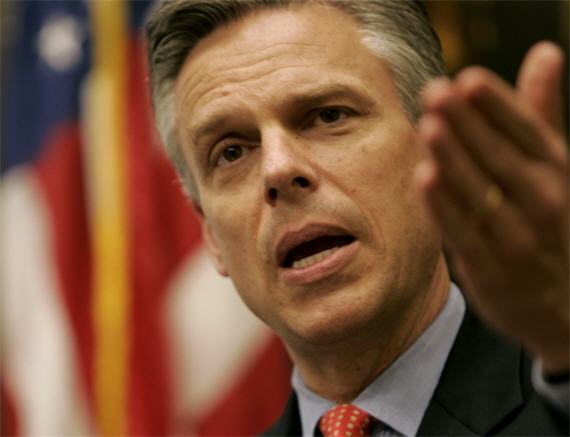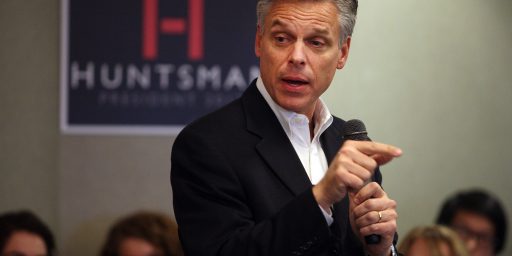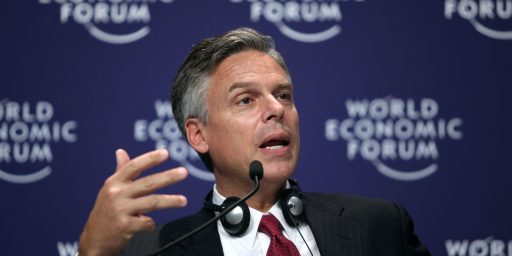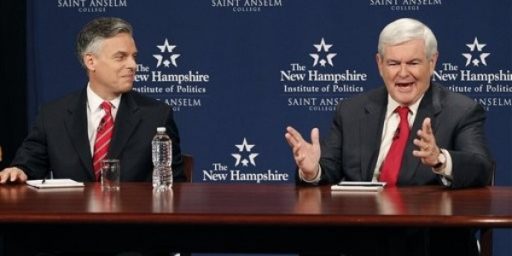Jon Huntsman: Moderate Who’s Really Conservative?
That a popular two-term governor of Utah is being rejected by likely Republican primary voters as insufficiently conservative shows just how extreme American politics has gotten.
That a popular two-term governor of Utah is being rejected by likely Republican primary voters as insufficiently conservative shows just how extreme American politics has gotten. Suddenly, the light bulb seems to be going on.
TPM’s Josh Marshall got to question Huntsman yesterday and came off impressed. And somewhat surprised:
Huntsman is only a moderate relative to the extreme right-wing turn of the current Republican party. And this is not a high bar. His views on economic policy are firmly to the right, just not nuts. He made a point of noting that he was the only candidate in the Iowa debate who was flatly against default. (“That’s not in the real world.”) But his basic diagnosis of our economic crisis is that regulatory overreach and ‘Obamacare’ have created ‘uncertainty’ that is keeping job creators on the sidelines. And that seems like a diagnosis and prescription at odds with almost all the available evidence.
He skirted the issue of taxes by saying he’s for revenue neutral tax reform — closing loopholes, lowering rates etc. The implicit message seemed to be: I’m not some hidebound Norquist type who’s not going to let any tax go up or any loophole get closed. Sort of gave him a little wiggle room. But still, no net new revenues.
He pointed to tax reform in his home state which he proudly noted the CATO Institute says is the best tax regime in the country. Again, not particularly moderate in my book.
One thing that really stuck out at me. Huntsman said he supports getting rid of the home mortgage interest deduction in its entirety. Really not sure how that plays in a general election or frankly in any election since it amounts to a really big tax hike for basically everybody and hits middle income voters particularly hard. If by some weird chance he’s the nominee, you’ll hear about that a lot.
The foreign policy is foreign involvement minimalism. He put himself to the left of Obama and Bush on Afghanistan, would like to get out sooner, etc. The general pitch was that pretty much all of our robust deployments in the Arab world and even legacy deployments in Europe are a distraction from the true challenges facing the country.
A piece in The American Conservative titled “Jon Huntsman, the No-Drama Conservative” sets the tone with its subtitle: The former Utah governor speaks like a diplomat, but he’s no moderate.
Huntsman had made no dent in the polls since his launch in June. Instead, the avalanche of prestige media mash-notes to his campaign had the effect of raising expectations ridiculously high and smothering him with the labels “soft” and “moderate” in an era when Tea-caffeinated primary voters are looking for “hard” and “right.” The hastily constructed campaign—largely built while the candidate was still serving as Obama’s ambassador to China—was subject to infighting and leaked acrimony that would outlast July’s reorganization. Huntsman was sinking almost as fast as Tim Pawlenty, his name recognition barely above Buddy Roemer’s.
But this rickety launch obscured more than it revealed. Huntsman may be uncomfortable in the ideological sweathouse that is the conservative movement. He may be diplomatic when the right is dyspeptic. But his candidacy offers conservatives two very tantalizing possibilities: a break with the Bush legacy on foreign policy and the chance to move their policy prescriptions off the Tea Party’s placards and into the center of our political debate. Huntsman’s record shows that conservative politics can triumph not just through conflict but also by concord.
[…]
Governor Huntsman allowed local officials to set their own policies, even when he wasn’t sure about them, and worked to impose his statewide agenda by diligently building consensus. “He worked well with our speaker and senate president and gave them a lot of autonomy,” recalls Hughes, “There are some things he got me to bend on that I joked later it was like a Jedi-mind trick.”
“I think it was through actual legislative victories that members of the legislature looked at us and thought, he is actually getting stuff done,” Huntsman says. His approval ratings got as high as 90 percent at several points during his years as governor. Initial reservations about him melted, and his legislation began passing with massive majorities. His gigantic tax-reform package sailed through both houses of the legislature unanimously.
“I have an easy rule of thumb,” says Hughes summing up his feelings on Huntsman. “If someone walks into the room and you cut $400 million in taxes and do school reform with him, you vote for him for president.” He turns fiercely protective of Huntsman’s credentials whenever a conservative outside Utah uses the word “moderate” to describe him.
“There’s a style he has that gets misinterpreted, and that’s a diplomatic style,” says Hughes, “he has reached out to all Utahns, and some people have mistaken his diplomatic approach for being a moderate. If you get to know the guy, his rudder is in the water.” Hughes has a point. For the past two decades a “moderate” Republican was one who generally didn’t side with his party on three issues: taxes, guns and abortion. Huntsman’s record on those isn’t just to the right of other moderates, it is to the right of most conservatives.
Huntsman’s tax reforms included $110 million in income-tax cuts, and would mandate a state-wide flat income-tax rate. Sales and food taxes were slashed too. The deal included tax credits aimed at attracting new business development, including mining. Because the state had a surplus in his first years in office, he also granted teachers a small pay raise and one-time bonus as part of the deal, an increase in spending that the Club for Growth calls “unforgivable.”
But the tax-cut package was the largest in the state’s history. The Cato Institute ranked Utah top in the nation for tax policy after Huntsman’s reforms. After the cuts in 2007, Utah’s revenues had the biggest drop in the nation, but have recovered quickly between 2009 and 2011.
Huntsman may be the pro-life cause’s most accomplished executive. He signed bills banning second-trimester abortions, reclassifying third-trimester abortions as a third-degree felony, and requiring abortion providers to explain the pain unborn children can experience during abortion. He signed a trigger law that would ban abortion outright if Roe is overturned. He opposes embryonic stem-cell research. And by establishing a state legal fund to defend these laws, he showed willingness to uphold state prerogatives.
And Huntsman expanded the rights of Utah gun-owners, abolishing some concealed-carry restrictions and allowing for more transport of firearms on Utah’s roads. He even signed a bill that would grant small-game hunting licenses to children under 12. In Jon Huntsman’s America, once a child survives the first trimester, he’s well on the way to having a rifle in his small hands and extra money in his pockets. If this qualifies as moderate, why be conservative?
“The ‘moderate’ label will fade away as people get to know his record,” says Whit Ayres, a Huntsman campaign pollster, “There are a few instances here or there, like on civil unions where he strays from what’s thought to be conservative orthodoxy, but Republicans don’t select their presidential nominee by going down a list of litmus test issues and disqualifying people.”
Well, why can’t he get any traction, then? Surely, it’s not simply that he speaks in moderate tones. Mitt Romney does, too, and he’s been a consistent frontrunner.
Huntsman can’t check the whole list, it’s true. He has Barack Obama’s 2008 position on gay rights: he is for same-sex civil unions but not marriage. He has John McCain’s latest position on immigration: he supports comprehensive reform and a path to citizenship for illegal aliens—conservatives call this amnesty—but he demands that the border be secured first. Yet the means to do that don’t excite him. He told a town-hall audience recently, “I mean, for me, as an American, the thought of a fence to some extent repulses me, because it is not consistent with … the image that we projected from the very beginning to the rest of the world.”
Huntsman also riled conservatives on some environmental issues. He has praised Nixon’s creation of the EPA. His party’s right wing castigated him for participating with other Western-state governors in a climate-change summit that yielded exactly nothing in terms of policy. But his record is not quite that of an out-and-out greenie. Nearly 70 percent of Utah’s land is owned by the federal government, and Huntsman’s administration routinely fought alongside business interests in his state against the Interior Department and environmental groups to develop Utah’s energy economy.
So, some hot button issues where much of the base is stuck in 1972 are hurting him. And the “son of a billionaire” thing and the fact that nobody outside of Utah had heard of him six months ago aren’t helping, either.
But where Huntsman really contrasts with his opponents is on foreign policy. In a field where some Republicans are chastising Obama for being weak, Huntsman hits his former boss for being reckless. “I look at Libya, there is no defined goal, no defined national security interest, no exit strategy and I say, ‘Why do we want to be involved?'” he told his Dartmouth audience in late July. Ayres says that Huntsman isn’t about withdrawing from the world stage but reorienting our policy: “Why do we have so many military bases in Japan, we’re half a century after World War II? Why so many in Germany? Does it make sense for America to remain in these places?” Huntsman believes that other candidates are kidding themselves if they think defense budgets should be off the table when discussing the nation’s overspending.
Huntsman is most anxious about changing the mission in Afghanistan, America’s longest war. In a recent speech he leveled with the crowd: “It’s time to recognize the reality of what we’re up against in Afghanistan. It isn’t a nation-building exercise, it’s counter-terror [that we need],” he said, “You don’t need 100,000 boots on the ground and the expenses that it carries. You need intelligence-gathering capability, a special-forces presence, and help training the Afghan-national troops.”
He can be blunt about the limits of American power. On a recent campaign stop he said flatly, “I’m here to tell you folks, we can’t do a damn thing about Pakistan. Only Pakistan can save Pakistan.”
Huntsman told the biannual conference of College Republicans in July that one of the four keys to the 2012 election was that “Republicans had to rethink foreign entanglements.” He describes himself as a realist and says the “number one priority” of American foreign policy needs to be “rebuilding our core at home.” By that he means growing our economy long term and creating a market where America can be a major industrial power again.
“I might sound like an isolationist, but I am not,” he told me, before punching back at his hawkish critics. “They haven’t been on the other side of the negotiating table with the Chinese,” he says coolly. “They clearly haven’t felt our diminished leverage in the international marketplace because of our weak core here at home. They clearly haven’t read the history about the end of empires where you have a diminution in values, you have a society that becomes bankrupt with debt, and overreaching abroad. It’s the same three or four things that have brought an end to any empire.”
This is music to my ears and gives me some hope that Huntsman can win over Tea Partiers who are fiscal conservatives with a less interventionist streak. But absent the polarizing effects of a Vietnam or a 9/11, Americans don’t vote on foreign policy.
Ross Douthat argues that Huntsman didn’t do himself any favors in his pre-launch:
Huntsman’s choices in early 2009, when he decided to raise his national profile by critiquing the “just say no” attitude of the G.O.P. Congress and then decided to actually join the Obama administration as ambassador to China. First impressions can be changed, but not without time and effort, and by running for president so soon after branding himself as the Obama White House’s favorite Republican, Huntsman pretty much took himself out of the running for the Perry-Bachmann-Tea Party vote. This narrowed his options for distinguishing himself from the other handsome Mormon ex-governor in the race, and after some halfhearted attempts to get Romney’s right, he seems to have decided (no doubt on the advice of John Weaver, his ex-McCainiac chief strategist) that his only chance at breaking out of the pack is to emulate John McCain’s impressive moderate-insurgent campaign in 2000, which won an upset in New Hampshire by doing exactly what Huntsman is trying to do now: Wooing the media and moderate Republicans by attacking his own party’s interest groups and intellectual blind spots.
Essentially, then, agreeing to become Obama’s ambassador to China raised a giant red flag. This, despite the longstanding tradition that politics ends at the water’s edge and the remarkable bipartisan continuity on China since Nixon’s 1972 “opening.” And Ross is right here, too:
By casting himself as the candidate of capital-S Science, touting his belief in evolution and global warming, Huntsman is staking out maverick-y positions on issues that matter far more to media-intelligentsia types than to most American voters. Given that this is a recession election, not a culture war election, a candidate trying to successfully brand himself as a “different kind of Republican” would be far better off breaking with conservative orthodoxy on an economic issue — by calling for looser money, maybe, or attacking the totally unpersuasive right-wing conceit that we need to raise taxes on the American working class. Instead, Huntsman is toeing the party line on pocketbook matters, and picking fights on boutique issues that are at best tangentially related to the major controversies of the Great Recession. It’s a good way to get press for his candidacy, but in this year of all years, I’m doubtful that it will translate into even a Paul-esque surge in the polls.
Defending a payroll tax cut extension, on the other hand, seems like a somewhat more promising way to stand out from the crowd.
Appealing to the intellectual class is getting Huntsman a lot more coverage than his standing in the polls merits. His only hope is that somehow translates into a strong showing in New Hampshire six months from now, giving him a springboard. It’s a longshot but likely the only one he has.






That guys like Jon Huntsman and Alan Simpson (both Western conservatives) are considered persona non grata by so many on the right says a lot about just how far right parts of the GOP have drifted over the past 30 years or so.
These GOP candidates wouldn’t make it today: Nixon, Bush (maybe both, certainly senior), Ford, Dole, McCain
He is toast. There is no room for realists in todays GOP. One need look no further than Cantor’s latest.
This just proves what I’ve been saying since I reached adulthood: anyone who is actually capable of winning the Presidency in the modern age should be fundamentally disqualified from holding the office. Anyone who can BS so many people into believing they’re something that they’re not cannot be trusted to be a leader simply on moral grounds.
Too bad about this.
That is still ideology first, budget and accounting second.
@racehorse:
How many of those Republicans ran on a platform of smaller government and lower spending but them raised taxes, increased spending, indulged in pork barrel spending, and even went as far as wage and price controls.
The reason that so many of the Tea Party types are mad is the failures of self-proclaimed conservative politicians to actually be conservative. As long as the Code of Federal Regulation grows and the private sector shrinks, the Tea Party types have good reason to be mad.
Huntsman, in taking the elitist position on immigraiton, clearly demonstrates that he has no business being in politics. Anyone who support open borders and unlimited immigraiton is supporting the extinction of any conservative politician and is supporting more government spending, bigger government, higher taxes, poorer schools, and more damage to the environment.
It is impossible to take anyone seriously one environmental, jobs, the economy, or eduaiton when that politician supports open borders and unlimited immigration.
Huntsman is just another elitist who support the extinction of the middle class and support turning the U.S. into another Mexico or China with a few extremely wealthy oligarchs and a huge number of poor people.
Anyone who considers Huntsman a real conservative must be an extreme liberal.
I find this analysis bizarre, Huntsman was an undistinguished governor in Utah (can you name any of his significant achievement as a governor?) who won elections because of his family connection (and being Republican) not because he was the best guy for the job. Absolutely no one knows him outside Utah.
Why should Republicans accept a man with no significant achievement in anything and being ideologically close to Obama as their nominee? What distinguishes him from Obama?
Your presentation of him as this “intellectual” guy who accepts science, and anyone who rejects him is a yokel is just bizarre.
@john personna: It worked for him in Utah. I gather that his plan, which he’s understandably soft peddling, is to save money and increase progressivity by, for example, severely means testing Social Security and Medicare. That is, in effect, a pretty significant tax increase on the upper brackets but done in a way that’s less ideologically offensive.
@tega: Everyone in Utah is a Republican, so it’s silly to say that he won on that basis–all his opponents were Republican. And read the excerpts and article; Huntsman was a very successful and enormously popular governor.
@superdestroyer: I remember the term “pragmatist” – no longer in use today. Nixon was the ultimate pragmatist and made no secret about it. He actually did a lot of innovative things and made some ground breaking achievements. Reagan was a pragmatist but did not like to admit to it.
@James Joyner:
I’d love to be for this, if I thought it were at all possible. I don’t think it is though. Even though I wholeheartedly support means testing, I think I’ve been convinced that there isn’t enough money there.
No, I’d need some good accounting authority to tell me this is possible. It doesn’t seem like it can be, with tax levels at a long term low, and with a population unwilling to accept true and deep austerity.
(If roughly speaking, taxes at ’50s levels, we’d need to simply slash all spending to ’50s levels, necessitating a return to poverty at ’50s levels. That would be “austerity” all right.)
“Everyone in Utah is a Republican”
Are you implying that there are no Democrats in Utah? Check the percentage of votes he got in 2004 against Matheson (who also comes from a prominent family in Utah). The mayor of Salt Lake City is a Democrat.
Successful in what way? Utah is a very conservative state with a large Republican legislature who has made conditions conducive for businesses. The state has always being friendly for business before Huntsman became governor.
Could you name any major achievement? He is not getting traction because he is an unremarkable guy, not because “right wing voters” don’t want a moderate. He is a Democrat in every sense, but party affiliation.
Heh, heh… hee hee hee haw haw haw….
Reading is fundemental.
How do you reckon Ben Nelson or Evan Bayh would do in a national Democrat primary? What about Zell Miller? Bob Casey? Phil Bredesen? Mike Easley? Ronnie Musgrove? Joe Manchin?
Joe Lieberman was the Democrat V.P. nominee in 2000; in 2006 he was ousted from the party via primary challenge for being too conservative on foreign policy.
Has the Democrat Party become too extreme?
@OzarkHillbilly:
Reading is indeed fundamental. Perhaps, I should have gone over what I wrote before submitting.
@Tsar Nicholas II:
Re: Lieberman – For being a NeoCon on foreign policy. In CT, which is a very liberal state, being a big (and utterly unrepentant) proponent for the Iraq war was a major liability. His general hawkishness wasn’t a big problem when we were mostly at peace. When he helped get us into a disasterous war, however, people got mad. At the time, the rallying cry of Dems who stuck with Joe was “with us on everything but the war!” But the war was a big deal.
I know less about the other examples, but in Lieberman’s case he was not cast out of the party because he was willing to compromise with the GOP. This wasn’t a case of political horse trading where he agreed to extend some tax cuts to get an extension of unemployment benefits. He didn’t run afoul of the Dem base because he was ideologically impure, but rather because he was totally gung-ho for a war that turned out to have been totally unnecessary and costly. I could agree with the guy on literally everything else but want him fired for that. And I did – I was one of the voters in the primary who tried to oust him. It was, in fact, the reason I registered as a Dem.
People who make egregiously bad, costly decisions should get fired. Joe is an example. Another would be Chris Dodd, but he’s retiring so I don’t get to try and fire him. Dodd was at the least incompetant and at most corrupt (quite possibly both) and deserves to be fired, regardless of ideology. The Iraq War cost Hillary my vote in the primary – I voted for that Obama guy instead. ‘course, we got Hillary at State, which I suppose is the universe’s way of laughing at me 🙂
@Tsar Nicholas II: Lieberman wasn’t “ousted from the party.” He lost a primary and chose to run as an independant.
Bellieve it or not, voters are not required to keep every hack in office simply because he’s won an election in the past. To vote against an incumbent is not a betrayal.
Now accuse me of being anti-semitic.
James,
“That a popular two-term governor of Utah is being rejected by likely Republican primary voters as insufficiently conservative shows just how extreme American politics has gotten. Suddenly, the light bulb seems to be going on.”
Funny, but some of us have been saying exactly this for years. Thanks for waking up to see what a group of radicals have done to your party.
What distinguishes him from Obama?
tega: do you know how to read?
EDIT: nevermind, I see someone already questioned your ability
Honestly, my only major quibble in this article would be with his stem cell stance. I’m not smart enough to understand whether his overall economic vision is good enough.
@Moosebreath: I would argue, though, that the “take-over” didn’t happen until the 2010 cycle. Yes, the fire breathers have become stronger in the debate over the years but the party nominated McCain in 2008, “compassionate conservative” GWB in 2004 and 2000, Bob Dole in 1996, and GHW Bush in 1992 and 1988. All mainstream guys. And, frankly, there’s a decent chance we’ll nominate Romney this go-round.
James, the ambassadorship disqualifies him in all practical terms. He can’t be the voice of the power in criticizing the administration he joined. The first job for a Presidential candidate is to get the support of his party, and the party won’t trust him.
BTW/ I’m not criticizing him accepting the ambassorship, any more than I think LaHood, Gates and the other Republicans should be criticized for being part of the administration. If they think they can do good, the more power to them. Its just a stupid move if your thinking about running against the administration in a few years.
James,
“I would argue, though, that the “take-over” didn’t happen until the 2010 cycle.”
I’d say that’s the point that the radical right became the majority of the Republican caucus. The signs were there before (which is not too different from what you said).
“And, frankly, there’s a decent chance we’ll nominate Romney this go-round. ”
I strongly disagree. Romney has far too many skeletons in his closet from the radical right’s point of view to be acceptable to a majority of Republican primary voters. You’ll know the primary season is heating up when there start to be ads quoting Romney’s speeches in prior campaigns, especially on the subject of abortion from his 1994 Senate campaign.
I’ve been saying this for some time. He’s not a moderate, he’s a conservative with a handful of moderate positions. But look through his stances on the issues at large, and you see a conservative. Not a hard core conservative, but more your run of the mill conservative. He only appears like a moderate because he’s not 100% boilerplate right wing, like is becoming the norm in the republican party these days.
Solomon Kleinsmith
Rise of the Center
@Tsar Nicholas II: So unless the Dems support the most conservative and or milquetoast Democrats (even those that criticize the party) they are extreme? Other than “NO YOU”, I have no idea where you’re going with this.
I guess this primary will tell us how far gone the GOP has really become. The meida coverage all goes to those trying to claim the title of most conservative; Perry, Bachmann, Palin, etc. Yet, Romney was the frontrunner. I suspect that was largely name recognition and legacy voters, but the primary will sort things out. At present, I think that the winner of the race to the (far) right wins the nomination. I hope I am wrong.
Steve
shows just how extreme
AmericanRepublican politics has gotten.FTFY
I will not vote for any GOP candidate who accepts a political appointment from a Democratic administration. I don’t give a damn what Huntsman’s politics are, he is now in my mind a Democrat. Most of the GOP moderate types that I speak to through the miracle of the “interwebs” feel the say way.
He’s damned by his association with the Obama administration. It’s that simple.
Rich Vail
Pikesville, Maryland
http:/thevailspot.blogspot.com